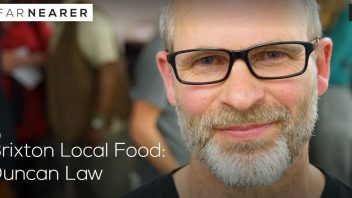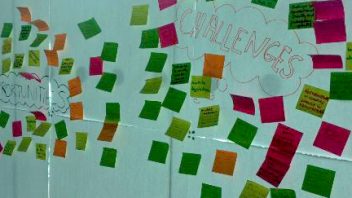

Fruitful Durham folks
Yet another beautiful city, is there something about Transition starting up in the more scenic parts of our country? Here in Durham I come across my first Transition Fruit Group, and when I met Jules he was delightedly clutching the papers of incorporation for the brand new enterprise Fruitful Durham which has just emerged blinking into the light.
This enterprise, a CIC and a co-operative, grew from the realisation that a large number of unmanaged orchards and other productive spaces were wasting a lot of fruit each year. These were mapped and are now being tapped into as feedstock for the enterprise, which will process and sell fruit and related products. It also promotes planting more fruit trees, aiming for 1 per resident (43,000!).
A small nursery also operates, grafting new stock for example. They also aim to teach secondary school pupils to graft fruit trees, which are then passed to the primary school for planting.
The kids can then watch their own trees grow over the years and eat the fruit – lovely! They will also encourage public planting, fruit hedges for example, rather than the ubiquitous evergreens.
Durham is surrounded by ex-mining villages where in many places the communities are falling apart. The enterprise is working with the villages to try a community orchard scheme where residents plant and manage the orchard, and which along with some traditional social events such as wassailing, starts to give some heart back to the community.
Community consultation & strategy
Last year, Transition Durham (TD) ran a successful community consultation process. This generated a number of ideas, which resulted in around 20 projects being identified across food, transport, building etc. Although these ideas were mostly aligned with Transition thinking, this then raised the question of priorities, and whether there were people in TD who were passionate about taking these ideas forward.

Map created as part of the What? No Oil? event
This was most strongly felt when the ideas were presented for funding to the Area Action Partnership, and the TD presenters did not necessarily have a clear sense of priorities or interconnection between the projects, as they had not emerged from within this group. The learning was that it’s one thing to consult the community, and possibly another to then deliver to their agenda.
A sense of ownership and passion are important for the success of any community project or enterprise, especially when relying on significant volunteer effort. So the group has since prioritised the projects in the different theme groups, along with a rough timeline, and will go back to the funder soon with a stronger story. But if someone from TD doesn’t step up to own a project, it won’t happen.
A lovely graphical representation of this strategy sits on the office wall. TD has a small office in a community building which is funded thanks to the connections of one of the core group with academic institutions, and the links built between researchers and TD.
Local food

Linking local producers to their customers
The food group is particularly strong – the Durham Local Food Network has been built based on a website tool which now has 400 members, all local producers or outlets that meet the ‘local’ criteria. Much of this is thanks to the work done by a MSc student who has committed much of her 3 year course to working on this. A Sustainable Local Food Strategy for County Durham has also been developed (contact for more info).
TD also benefits from strong academic links with people in the core group also part of the University of Durham. These connections have helped unlock some funding streams, which contribute to the running costs of the office space, for example.
Wilf, one of the founding members of TN set up a CSA enterprise called Abundant Earth run on permaculture principles (and which pre-dates Transition).
Just outside the city, it offers local seasonal organic produce via a food hub model, as well as permaculture and growing courses. My sense is that the permaculture principle of ‘slowness’ i.e. letting things emerge at their own pace, has strongly influenced the TD approach.
This recognises that things take time and emerge when they are ready, for example, Fruitful Durham. At the same time, some strategic work has been done that sets an intention for certain things to happen and to help focus limited resources.
Slow versus fast?
As a lover of getting as much done as I possibly can, as quickly as I can (though I am working on this addiction!), I appreciate the sense of space and ‘natural order’ that can come with slow and steady. I wonder what the optimum balance is between the ambition to respond with the required urgency and scale to address the problems we face, and seeding a few things and seeing what crops up, possibly without as much of the burnout, frustrations and wrong decisions of the accelerated version.

Beautiful allotments in the heart of the city
Hmmm, I haven’t got the answer to that one, but possibly it’s to do with having some sort of capacity (skills and time) in a Transition initiative to imagine, plan, resource then deliver a set of projects that are aligned around a clear set of goals – as well as make the most of the opportunistic things that pop up.
So far on my trip, those places that have some paid resource at the centre seem to be doing more of this (plenty of things are happening in places where this isn’t the case, but possibly not in such a ‘held’ strategic way).
However, bringing in funding to pay someone at the centre of a TI raises a whole lot of other questions and issues – often you need to be a constituted body (e.g. a charity or company limited by guarantee), it can introduce tension between paid workers and volunteers, paid workers need managing, other HR issues need to be addressed and so on. Do the advantages make this worth the hassle? I will ask the places that are pursuing this model to share their thoughts on this, as well as those that are consciously not choosing this route.
One other useful thing I learned from Wilf was about the LAND Group Visit Scheme (now suspended due to high demand), where the Permaculture Association funds hosted visits between projects, covering expenses and the host’s time. We talk about how a similar model could help share learnings and inspiration between emerging Transition enterprises around the region, or nationally. I’ll look into this further on my return.
What’s next?
TD is looking to grow a local economics/livelihoods group, and is planning some visioning events for the autumn. Their local spatial strategy process ends by March 2013 and so there is an opportunity to input some Transition thinking into this process, which helps define a deadline.
Jonathon Porritt recently slammed Durham County Council’s flagship economic strategy as “completely manic, way over the top and unbelievably damaging” so it sounds like there is much scope for improvement there!
Main image: Fiona Ward and Wilf Richards of TD & Abundant Earth.







Connect